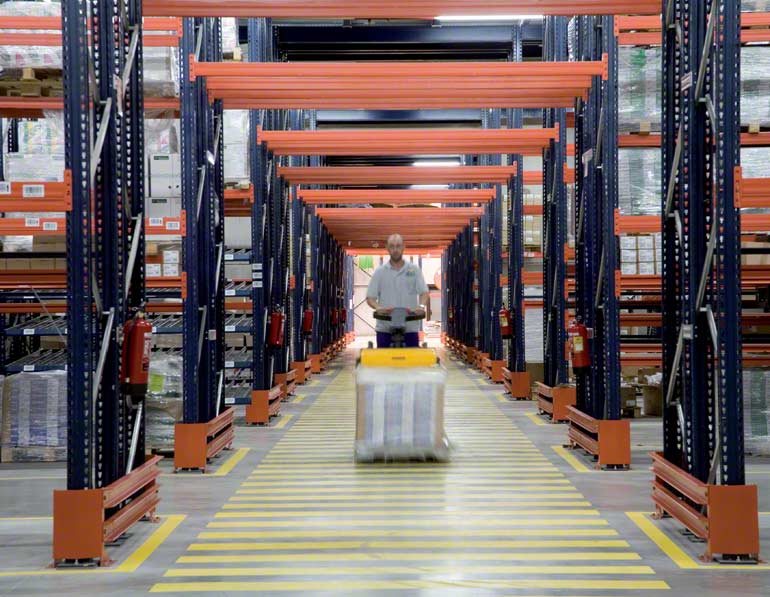Floor level order picking refers to preparing orders by positioning full loads (pallets, for example) on the ground, and taking units from these to create final orders.

Warehouse installed for a company in the distribution sector.
Possible systems
The most appropriate system for preparing orders at this level consists of grouping full loads in a suitable area, in order to make order preparation as fast as possible. To do this, loads can be arranged in a single file, in two or more parallel lines, or in a U-shape.
Loads can be arranged in a single file when the number of components in the average order (the most common of the warehouse operations) is not too high and, therefore, a row of the appropriate size can be established. The person preparing the order can do their work in an acceptable time, without becoming excessively tired. This arrangement can also be used when the space available for picking so demands, either because the picking area is elongated or because there is no other alternative.
Full loads can be arranged in two or more parallel rows and is appropriate when there is an option to duplicate or multiply the picking area. An aisle must be left between rows so that the people preparing the orders can move around.
The third configuration that can be adopted is a U-shape. This can be useful when there are both few or many full loads. It offers the significant advantage of very quick picking, although it has the disadvantage that it requires more space.
Reasons for preparing orders at floor level
This strategy involves lower investment costs and, while this could be a reason in itself to choose it, it is not the only one. Picking speeds are faster with this system, given that positioning unit loads on the ground reduces the time involved in searching for the pieces or parts for the order.
Since the units are located on the ground, access to them is also easier than when they are positioned on racking units at different levels. There is less chance of making mistakes, since the operator can be physically close to the part or pieces to be picked, thereby helping them identify these parts or pieces and providing more accurate control. This significantly reduces the likelihood of mistakes, both in picking and in immediate control.
The main disadvantage of this option for positioning loads is that if there is not much space available, it can only be used for a small number of SKUs.

Warehouse installed for a company in the distribution sector.
The most appropriate equipment
The most appropriate equipment for picking at ground level is pallet trucks, both manual and the self-propelled variety with the driver mounted or on foot. In general, all versions of pallet trucks, or even a simple manual trolley, can be used as handling equipment for picking at ground level.
However, the ideal vehicle, which is designed to prepare several orders at the same time, is a low-level selector or picker (discussed in the article "Types of forklifts").

Operator handling a load using a pallet truck.
